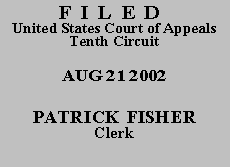

| UNITED STATES OF AMERICA,
Plaintiff - Appellee, v. JOSE VAZQUEZ-PULIDO, Defendant - Appellant. |
96-CR-210-JP)
|
Finding the hearing testimony of trial counsel more credible than that of defendant, the magistrate judge rejected defendant's contentions that he was not aware of his right to testify and that counsel prevented him from testifying even though he expressed his desire to do so. Accordingly, the magistrate judge concluded that defendant had not met his burden of establishing that his trial counsel's performance was constitutionally ineffective, and recommended that the district court dismiss the § 2255 motion. The district court adopted the magistrate judge's report and recommendation over defendant's objections and dismissed the motion with prejudice.
Before we can address the merits of this appeal, defendant must obtain a certificate of appealability (COA) by making "a substantial showing of the denial of a constitutional right." 28 U.S.C. § 2253(c)(2). The district court denied defendant's application for a COA, but we will construe defendant's notice of appeal as a renewed request for a COA. See Fed. R. App. P. 22(b)(2). To meet his burden under § 2253(c)(2), defendant must show that "reasonable jurists would find the district court's assessment of the constitutional claims debatable or wrong." Slack v. McDaniel, 529 U.S. 473, 484 (2000). After carefully reviewing defendant's counseled brief, the record, and the pertinent law, we conclude that defendant has not met his burden.
Based on the testimony she heard at the evidentiary hearing and her assessment of the witnesses' credibility, the magistrate judge found that defendant was aware of his right to testify, that trial counsel always advised his clients that they had the right to testify and did not deviate from this practice with defendant, that counsel recommended that defendant not take the stand but did not order defendant not to testify, that defendant trusted his counsel and took his advice, and that defendant did not insist that he be called to testify after he heard his brother's testimony. In light of these findings, the magistrate judge concluded that defendant had not met his burden of showing that his counsel's performance was either objectively unreasonable or prejudicial, as required by Strickland v. Washington, 466 U.S. 668, 687 (1984). The district court adopted these findings and conclusions as its own.
"We review the district court's fact findings in a section 2255 proceeding under the clearly erroneous standard, although the performance and prejudice prongs under Strickland involve mixed questions of law and fact which we review de novo." United States v. Whalen, 976 F.2d 1346, 1347 (10th Cir. 1992) (quotation omitted). Our independent review of the hearing transcript reveals no error in the district court's findings of fact or in its ultimate conclusion that trial counsel was not constitutionally ineffective. Because reasonable jurists would not find the district court's assessment of the constitutional claims debatable or wrong, defendant is not entitled to a COA.
Defendant's request for a certificate of appealability is DENIED and the appeal is DISMISSED.
Entered for the Court
John C. Porfilio
Circuit Judge
*. This order and judgment is not binding precedent, except under the doctrines of law of the case, res judicata, and collateral estoppel. The court generally disfavors the citation of orders and judgments; nevertheless, an order and judgment may be cited under the terms and conditions of 10th Cir. R. 36.3.
1. After examining the briefs and appellate record, this panel has determined unanimously to grant the parties' request for a decision on the briefs without oral argument. See Fed. R. App. P. 34(f); 10th Cir. R. 34.1(G). The case is therefore ordered submitted without oral argument.
2. Defendant also alleged that his counsel was constitutionally ineffective in pursuing a particular defense strategy, but defendant failed to object to the magistrate judge's report and recommendation as to this claim and failed to raise it on appeal. Therefore, the claim is waived.